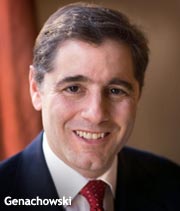FCC Hints Cable Carriage Payments Could Lessen
- by David Goetzl @dgoetzl, May 22, 2012
 Speaking at the national cable convention
on Tuesday in Boston, FCC Chairman Julius Genachowski offered cable operators some hope that carriage payments to broadcasters could go down, citing the rise in blackouts and an FCC examination of
shared services agreements. But he gave no indication that the process is moving with any alacrity.
Speaking at the national cable convention
on Tuesday in Boston, FCC Chairman Julius Genachowski offered cable operators some hope that carriage payments to broadcasters could go down, citing the rise in blackouts and an FCC examination of
shared services agreements. But he gave no indication that the process is moving with any alacrity.
“Creators of programming have the right to charge for carriage of their programming,” he said.
Consumers, however, have increasingly complained as standoffs between operators and stations have led to stations removing their signals. The law governing retransmission consent has been in place for years, and Genachowski indicated that it could use a reexamination.
In the last five-plus years, stations have begun moving aggressively to charge operators -- cable, satellite and telco TV ones -- for offering their stations. Companies such as Nexstar and Sinclair led the charge early and now CBS and NBCUniversal are making noise about taking in hundreds of millions of dollars.
advertisement
advertisement
“There are questions about whether that framework is addressing some of the issues that are coming up now,” Genachowski said.
Any amendment, however, may be beyond the scope of the FCC and lie with Congress. One area that the FCC could take action on and is looking into is the viability of shared services agreements, where a station owner in a particular market signs a deal allowing it to effectively operate a station owned by another entity there.
That can allow the single entity -- which could include more than two stations -- more heft in negotiating carriage deals. “That raises real issues,” Genachowski said.
The American Cable Association, which represents small and mid-sized operators, has said cable operators have provided data to the FCC showing “they pay from 21% to 161% more for retransmission consent when they are required to negotiate with a single entity representing two network affiliated stations in the same market. "
From the operator perspective, a limit on the shared services agreements would help, but a station group could still own more than one outlet in a market under certain conditions. Also, operators might get some relief in small and mid-sized markets, but major cost reductions in expensive large markets are not likely to occur.


